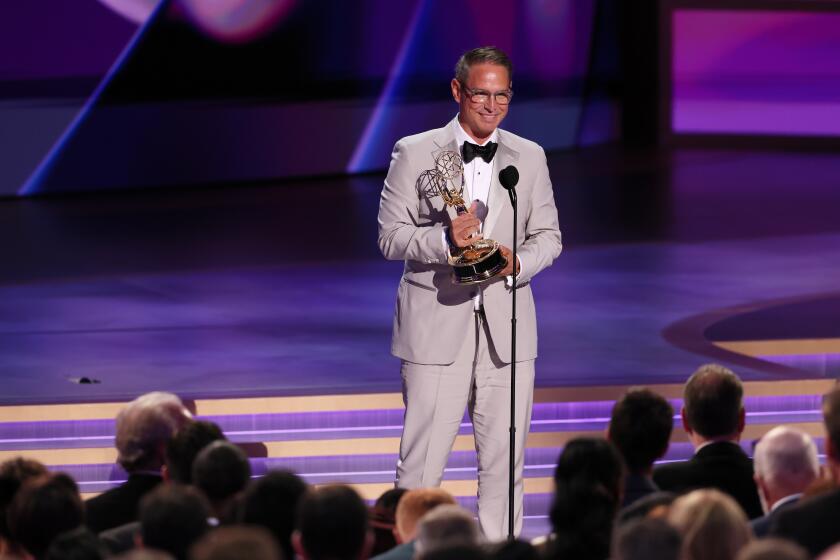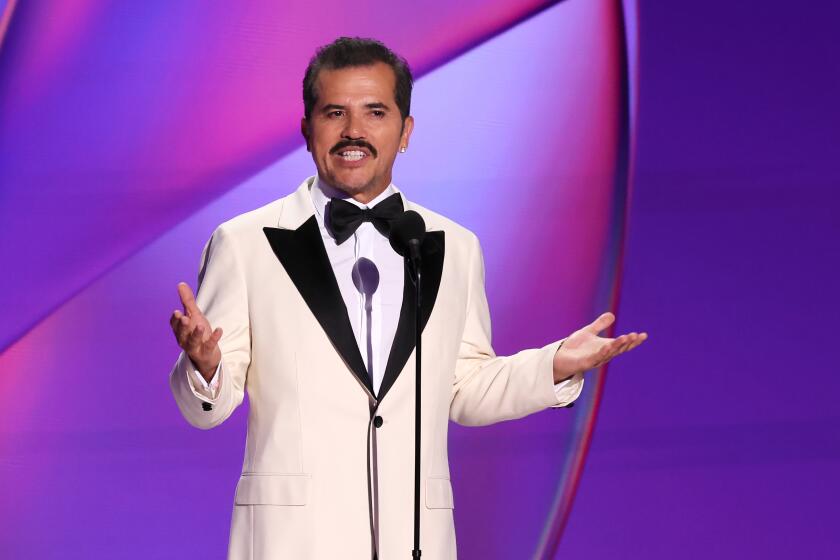These Emmy Awards are not a popularity contest
When the 1960s period piece “Mad Men” won the Emmy for outstanding drama series at Sunday’s 60th annual Emmy Awards, it made history in at least two ways. It became the first basic-cable program to take top series honors. But it also added a more dubious mark: Compared with previous Emmy series winners, “Mad Men” is by far the least-watched, with an average of fewer than 1 million viewers tuning in during its first season last year. That’s a fraction of the audience of even NBC’s ever-ratings-challenged “30 Rock,” which again took the comedy prize this year.
Oprah Winfrey said at the outset of the award telecast, “Nothing connects us quite like television.”
The sentiment may be hard to argue with, but it’s out of step with the times. Anyone who bothers to look at the ratings can see that prime-time TV is no longer the great connector it once was. It may be the only remaining medium that can still unite 30 million people for, say, a broadcast phenomenon such as “American Idol.” But disproportionate amounts of attention online, in print and among TV academy voters are now devoted to niche programs such as “Top Chef,” “Damages” and “Mad Men.”
And for the most part, that trend is the culmination of an explosion of original programming that has taken place on basic-cable networks over the past several seasons.
Whatever their flaws -- and you don’t have to be a TV fanatic to discern many of those -- the Emmys have over time reflected the broad trends that shape television programming.
The awards may not react as quickly as some critics would like. But over the last few years academy voters have rewarded once-bit players such as AMC and Showtime for the huge investments they have made in original comedies and dramas.
In 1993, HBO’s “The Larry Sanders Show” made history by becoming the first cable series to draw a best series nomination. Earlier this decade, HBO series were actually taking home the prizes: “Sex and the City” in 2001 and “The Sopranos” three years later. Now, no one questions that cable could easily corner the market on “quality” programming.
This has happened relatively quickly. During the ‘80s, then-nascent cable programming wasn’t even eligible for Emmy recognition. Networks dominated all -- sometimes single networks. In 1987, all five of the comedy nominees were NBC shows (including the winner, “The Golden Girls”). But over the last decade, the networks have beat a partial retreat from expensive scripted series and big-budget “long form” programming. Instead, they are putting on more low-budget reality and game shows.
Thus the Emmys now reflect a TV world that keeps fragmenting into ever-smaller tribes. The huge investment made by the basic-cable networks has resulted in shows that win near-network-sized viewers -- most notably, TNT’s cop drama “The Closer” -- as well as shows that win Emmys. It has seldom resulted in shows that do both. Because the basic-cable networks put on far less original programming than their broadcast counterparts -- typically, two or three hours per week, versus 22 hours weekly for ABC, CBS or NBC -- they can afford to be strategic in how they develop and market new shows.
Meanwhile, HBO -- which dominated the series categories during the glory days of “Sex and the City” and “The Sopranos” earlier this decade, but is in a fallow period with its drama series these days -- collected the bulk of its trophies Sunday for its movies and miniseries, such as “John Adams” and “Recount.” And broadcasters, which have devoted more hours of late to inexpensive reality programming, have found themselves increasingly sidelined at Emmy time. The TV academy has taken pains to give the unscripted genre its proper due; indeed, “Survivor” host Jeff Probst, one of five Emmy co-hosts, specifically thanked voters for including reality series when picking up his trophy.
Sunday night brought several upsets that might have proved actually upsetting if viewers had more at stake in the outcomes. Bryan Cranston was nominated three times but never won as the dad in “Malcolm in the Middle,” which looks destined to go down in history as network TV’s last hit family comedy. Instead, Cranston won Sunday for “Breaking Bad,” the little-seen AMC drama that aired a strike-shortened season of just seven episodes.
Likewise, Glenn Close won her first series Emmy for “Damages,” FX’s ratings-challenged legal thriller. That was maybe not surprising, although Zeljko Ivanek’s victory as supporting actor certainly was. In his category he cruised past old hands such as William Shatner (“Boston Legal”) and Ted Danson (also of “Damages”).
Indeed, these days the Emmys sometimes look as if they are attempting to bestow “event” status on programs that might not otherwise capture that distinction. HBO’s miniseries “John Adams” drew modest audiences and divided critics, but nevertheless won a record 13 Emmys. That’s four more than the total for the ABC miniseries “Roots,” a landmark TV event that riveted the nation for eight straight nights in 1977. Of course, that disparity may be partly because “Roots” came at a time when many other networks were competing to make long-form dramas. The same cannot be said of “John Adams.”
Indeed, it may be a sign of these culturally divided times that “Mad Men,” the little show that made history, did not mount anything resembling an Emmy sweep. Out of its 16 nominations, the show won six awards.
--
Scott Collins writes the Channel Island column in Calendar.
--
(BEGIN TEXT OF INFOBOX)
Emmy versus audience
The Emmy Awards are meant to reflect quality, which does not always sync up with popularity. Prime-time television’s top-rated series last season was “American Idol,” which averaged more than 28 million viewers per week but garnered just five Emmy nominations, while “Mad Men” averaged fewer than 1 million viewers but collected 16 nominations. Here are other examples.
*--* Comedy Noms. Wins Ratings Two and a Half Men (CBS) 7 0 13.6 million The Office (NBC) 8 0 8 million 30 Rock (NBC) 17 7 6.4 million Entourage (HBO) 5 1 2.5 million Curb Your Enthusiasm (HBO) 4 0 965,000 Drama House (Fox) 4 1 17.6 million Lost (ABC) 7 0 13 million Boston Legal (ABC) 7 0 9.6 million Damages (FX) 7 3 2 million Dexter (Showtime) 5 0 930,000 Mad Men (AMC) 16 6 925,000 Reality competition American Idol (Fox) 5 1 28.8 million (Tuesday night average) (Monday shows only) Amazing Race (CBS) 6 1 11.8 million Project Runway (Bravo) 5 0 3.3 million Top Chef (Bravo) 3 1 634,000 *--*
Source: Nielsen Media Research ratings for 2007-08 television season.
More to Read
The complete guide to home viewing
Get Screen Gab for everything about the TV shows and streaming movies everyone’s talking about.
You may occasionally receive promotional content from the Los Angeles Times.







